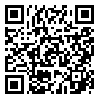BibTeX | RIS | EndNote | Medlars | ProCite | Reference Manager | RefWorks
Send citation to:
URL: http://jdisabilstud.org/article-1-2341-en.html
2- Department of Exceptional Children and General Psychology, University of Tehran
3- Department of Clinical Psychology, Shahid Beheshti University of Medical Sciences
Background & Objectives: One of the fundamental concepts in psychotherapy is dysfunctional spiritual schemas. These schemas confuse and obscure people's relationship with God and destroy transparency. They create problems for the individual in order to adapt to the laws of God, society, and the environment and reduce the individual's adaptation. Dysfunctional spiritual schemas result in failure in doing jobs. Despite extensive search on popular Iranian and foreign websites, no standardized Persian or foreign scale was found to measure dysfunctional spiritual schemas. Considering the importance of a suitable tool for measuring dysfunctional spiritual schemas, we aimed to design a spiritual dysfunctional schema questionnaire and validate its psychometric properties.
Methods: The present research aims to design and validate a study instrument for measuring dysfunctional spiritual schemas. The study population comprised all staff working for Offshore Oil Company in 2019. A total of 200 individuals were selected by the purposive sampling method. The inclusion criteria included lacking a history of psychiatric disorder, not using specific drugs, giving informed consent to participate in the study, having avoidant and anxious attachment styles to God, and lacking physical limitations disrupting personal care. The exclusion criterion was lack of study cooperation. To design the questionnaire items, we reviewed the relevant texts and interviewed the experts and the target population. To check the content validity (content validity index and content validity ratio) and the face validity, 10 final users were used. Then, to evaluate the construct validity of the questionnaire, the exploratory factor analysis method was used. To evaluate the reliability of the questionnaire, the Cronbach alpha coefficient and test–retest method were used. Data analysis was performed using SPSS 24 at a significance level of 0.05.
Results: The results of the qualitative content validity of the instrument led to the removal of 19 items and revision of 6 items, and finally, a questionnaire with 51 items was prepared. The mean ± SD age of the participants was 45.71±9.45 years. Factor analysis identified ten factors with a specific value of more than one, which together explain 56.75% of the variance. In other words, the dysfunctional spiritual schema questionnaire consisted of ten factors. The results of data analysis showed that the first factor has the highest eigenvalue and the observation of factor loads and factor structure also confirmed this finding. The Cronbach alpha subscales of this questionnaire were as follows: emotional deprivation of God, 0.91; spiritual abandonment, 0.79; spiritual defectiveness and shame, 0.81; spiritual vulnerability, 0.79; spiritual self–immaturity, 0.89; spiritual obedience, 0.76; stubborn spiritual criteria, 0.83; entitlement/spiritual magnanimity, 0.78; negativity/pessimism, 0.85; infidelity and polytheism, 0.82; and total questionnaire, 0.86. To evaluate the instrument's reliability, a correlation coefficient of 0.78 was obtained between two tests with one week interval, indicating the appropriate reliability of the questionnaire. The correlation coefficient subscales of this questionnaire were as follows: emotional deprivation of God, 0.76; spiritual abandonment, 0.7; spiritual defectiveness and shame, 0.71; spiritual vulnerability, 0.71; spiritual self–immaturity, 0.75; spiritual obedience, 0.69; stubborn spiritual criteria, 0.74; entitlement/spiritual magnanimity, 0.68; negativity/pessimism, 0.74; infidelity and polytheism, 0.73; and total questionnaire, 0.78.
Conclusion: According to the study findings, the dysfunctional spiritual schemas questionnaire is a reliable and valid tool, and the components of this questionnaire accurately measure the various dimensions and aspects of dysfunctional spiritual schemas. So, it can be used in research and consulting departments.
| Rights and permissions | |
 |
This work is licensed under a Creative Commons Attribution-NonCommercial 4.0 International License. |



